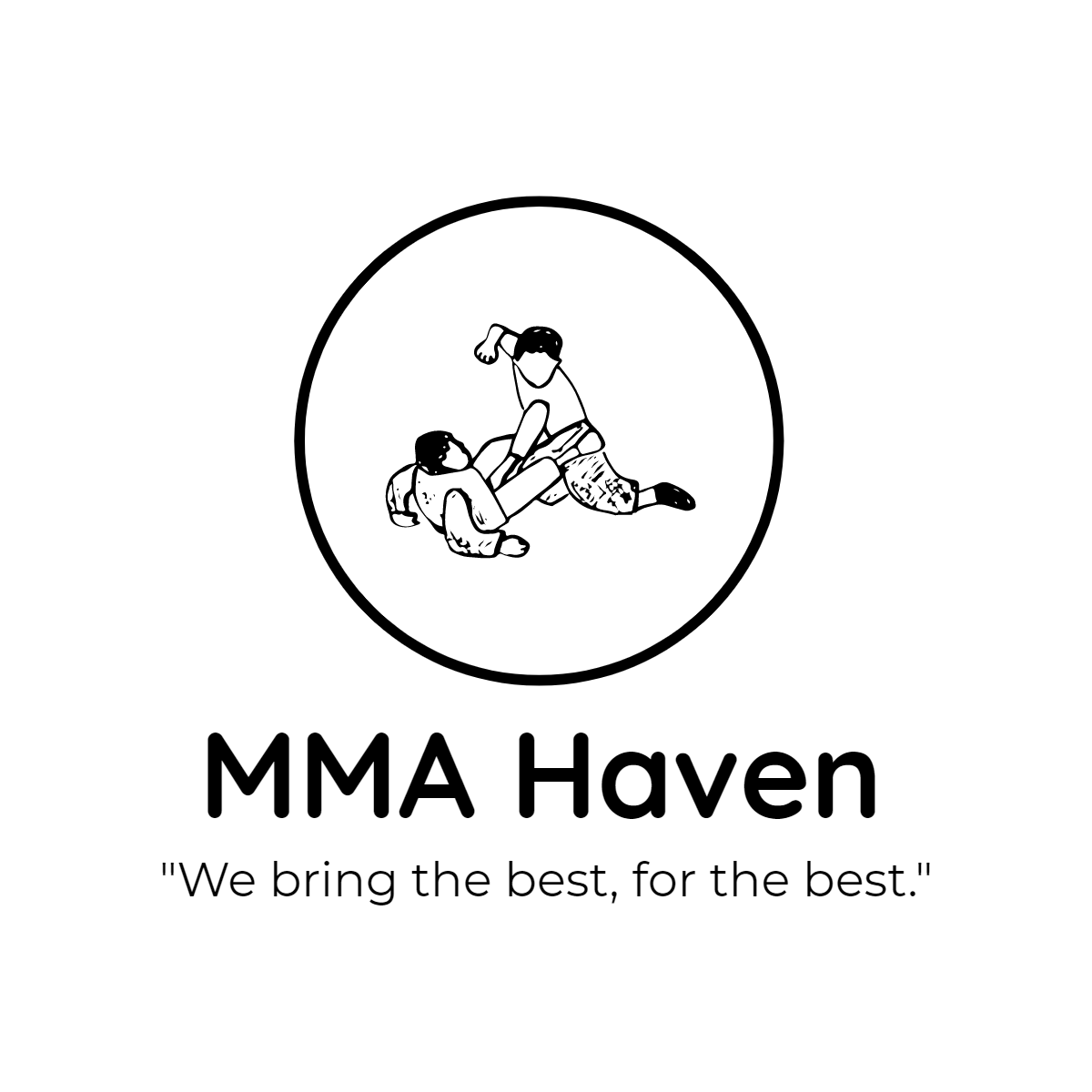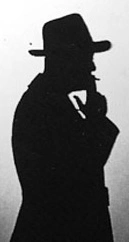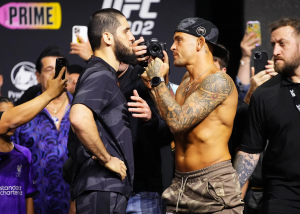UFC 302: Poirier vs Makachev
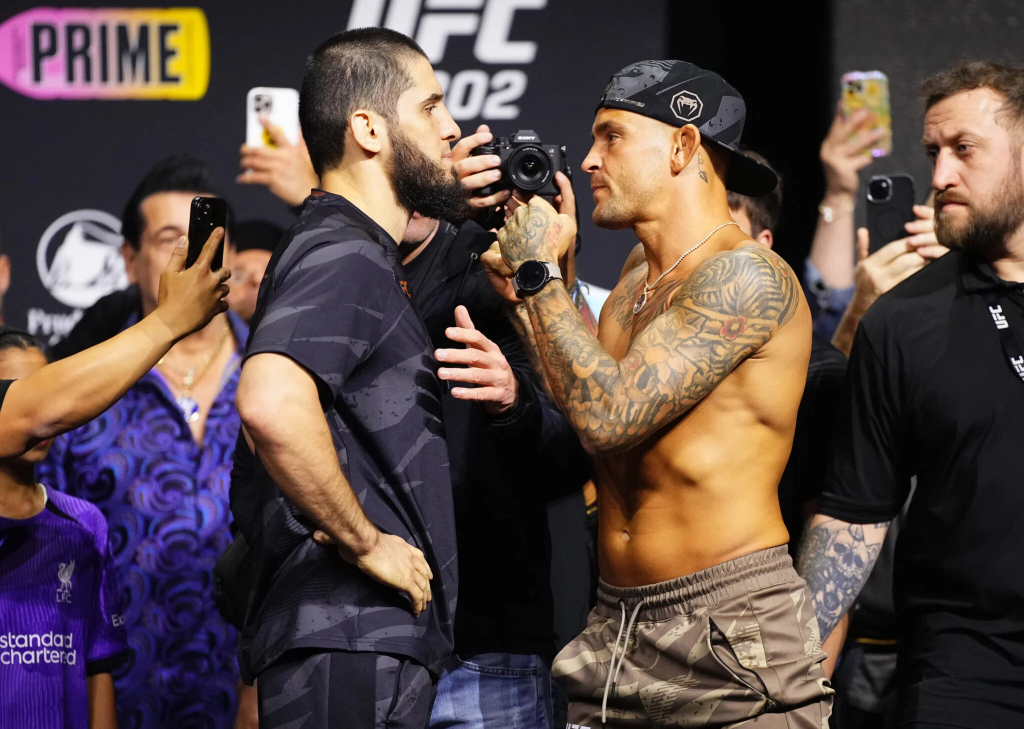
It’s been brought up in every single promo, road to UFC, countdown, whatever, but the aftermath of Khabib Nurmagomedov’s retirement was pure chaos in the lightweight division. With the return of Conor McGregor being spoiled by Dustin Poirier, and Oliveira on a blazing winstreak, in came former Bellator Lightweight Champion Michael Chandler, while former Interim Champion Justin Gaethje, Khabib’s last title defense, sat in the wings. The four of them fought it out, with Oliveira triumphing over his contemporaries. Many in the MMA fanbase began calling Oliveira the next lightweight great, and some even began picking him over Khabib himself.
Meanwhile, Khabib’s teammate and protege Islam Makachev made his way up the rankings; rife with frustration from cancelled fights and pullouts, Islam won, quietly at first, then loudly, putting emphatic finishes on what used to be smothering domination. Makachev began calling for a shot at Oliveira’s title(no, I don’t care about the weight miss.)

In a performance that shocked some and validated others, Makachev dominated Oliveira for a second-round submission win, shutting down any hope of Oliveira trouncing a prime Nurmagomedov, and set up a title fight with UFC Featherweight Champion and the pound-for-pound king, Alexander Volkanovski.
In a performance that some will tell you was an utter domination by Islam, a robbery that stole Volk’s second belt, an amazing performance from both, or a mediocre one from both in different areas, Islam secured his pfp status in a unanimous decision win, and put an emphatic stamp on it when he knocked Volk out in their rematch after Oliveira pulled out of his own rematch.

But with Max Holloway slumping Justin Gaethje in a BMF title bout after a dominant 25 minutes, and Oliveira losing to Tsarukyan, Islam would’ve been stuck in another period of inactivity that would’ve not only wasted his prime, but held up the division with lack of a clear contender.
Enter “The Diamond.”

Poirier wasn’t exactly the ideal contender; unquestionably a legend of the division, sure, but not only does he physically lack hips and has historically struggled with wrestlers, he was also coming off what, as a massive Poirier fan, this author considers to be his worst performance in nearly a decade against the worst opponent he had fought in nearly a decade against Benoit St-Denis, a fight in which he not only looked downright atrocious standing by the standards of a man widely regarded as the best striker in the history of 155, but also struggled massively in the clinch, wrestling, and grappling departments, the champion’s strongest areas. Not only did the former interim champion struggle, however, he looked downright regressed compared to his previous fights; the KO loss to Justin Gaethje probably explains such a regression, as well as his age, but either way, Poirier was seen as a stylistically easy, keep-busy fight for Makachev. He wasn’t particularly deserving of the shot, but just so happened to be in the right place at the right time.
This was the consensus going into UFC 302, despite a wave of hopeful Poirier picks on the basis of Islam’s limited showing against fellow southpaws, and Dustin’s career of beating up fellow southpaws; and while the fight itself was a dominant showing from Makachev on the scorecards, ending in a fifth round submission for Islam, Poirier shocked the world by putting on his best performance in a title fight to date. The fight shook up what was previously an offensively boring card, in which Makachev showed impressive durability, composure, and striking, while Poirier’s defensive grappling was shockingly up to par.
Makachev’s detractors, such as myself, pin Poirier’s success on Islam’s flaws, and Islam’s successes on the feet on Poirier’s age(after all, he was 35 years old.) Yet oftentimes in MMA, as well as life in general, two things can be correct at the same time; it’s difficult to differentiate where Poirier’s regression and Makachev’s evolution begin and end, but this article will attempt to do so.
The Opening Moments
The opening moments were ones that the more educated fans were interested in; how would Makachev, a southpaw striker who had made a career off of exploiting the open-stance matchup(an orthodox opponent vs a southpaw) deal with the best close-stanced southpaw in MMA history?
The answer?
Level change feints alongside his jab feints.
While Islam’s defense was primarily based on giving ground, generally bad for pressuring an opponent since one wishes to eat up space while pressuring, Poirier was so wary of the threat of Islam’s takedowns that he conceded the back foot immediately.
The lead hand dynamic was clear early; with two lead-hand heavy southpaws, whoever won the jabbing battle was going forward, and thus, seemed to have an advantage. Bar a single kick early, Islam’s kicks disappeared in this contest; since Dustin’s southpaw stance meant that he was mirroring Islam’s, his body wasn’t open for Islam’s rear kick to easily land like it was for Volkanovski.
The opening round couldn’t have gone better for Islam; after Dustin stepped in with a committed jab, Islam’s left hand grazed Dustin’s temple over the top, and his lead hook grazed Dustin’s guard. With Dustin squared up, Islam followed him with a combination, squaring him up on the cage for a takedown. Islam’s punches were wonky, but speed and competent shot selection went a long way for him.
From the opening bell, Islam had taken Dustin down, and ended up in side control. Dustin was content to lockdown in halfguard, and wait for Islam to make his move
Dustin defended by extending his arm and attempting to sit up; when Islam readjusted his weight, forcing him back down, Dustin sat up, released his lockdown, and bucked Islam off. Using his left hand, he pushed off of Islam’s body and spun up to his base. Islam, however, anticipated this, and transitioned beautifully to Dustin’s back.
The Diamond begins to shine… kind of
The first round couldn’t have gone any better for Islam; he showed that he could easily take and hold Poirier down as anticipated by many, and he dashed the hopes of an early Poirier KO before any grappling happened. Historically, a sustained wrestling attack has given Dustin immense trouble, and Islam didn’t give any reasons to think he’d slow down. For Poirier fans, his survival on the ground was a moral victory, but didn’t give much hope that he’d be capable of preventing Islam from doing it to him again.
Dustin flipped this narrative almost immediately.
This was significant for both men. For Dustin, he could defend Islam’s takedowns in open space, he wasn’t completely helpless in longer wrestling exchanges; as a result, he’d be more likely to open up on the feet. As for Islam, he just completely scared Dustin off from throwing outside leg kicks, giving Islam complete control of the striking at range; with the threat of Islam’s reactive takedowns muted, but his big range tool denied, Dustin was encouraged to open up on the feet, but only with his hands. As a result, the fight became more and more competitive throughout the second and third rounds.
As per usual, Islam chose to fight outside of the range of his opponent’s jab, with his main method of defense being to give ground, scooting backward in a straight line. Because of the distance, Dustin had to work with his jab and two-punch combinations to try and track Islam down; however, Islam was so far out of range that he could read a stutter step feint the same as a committed jab.
Dustin isn’t a bad pressure fighter, but he isn’t a committed one, so Islam could circle off for free and not be caught on the cage with an unloading Poirier. Additionally, the reactive takedown threat made Dustin wary of tracking Islam’s exits with shifts, or committing too hard to longer combinations.
This takedown threat, combined with the distance, allowed Islam to lead for free without threat of committed counters, or the danger if he messes up and has to scoot back straight.
Additionally, he could cut off Dustin’s entries with first-layer counters; it didn’t matter if it was a fully landed one, or simply a feint. Dustin would back off, and Islam would be safe.
However, without the comfort of his open-sized kicking game, Islam had to find a new way of maintaining that distance against Dustin. Commentator talk all the time about how exhausting it is to fight backwards, as opposed to forwards, but that’s generally a result of MMA fighters not knowing how to do it properly. MMA fighters tend towards wide, inefficient circling rather than tight pivoting, and tend to utterly collapse when forced back, so as a result, fighting backward is generally exhausting for them.
Unless your opponent is completely hapless, nobody can win a fight by simply kicking, potshotting and circling off; it’s practically a guarantee that you will have to close the distance on an opponent, do your work, then exit to maintain your preferred range. Islam’s answer was twofold.
The first tactic he used was chasing The Diamond out of the pocket with combos. He’d back up, then, as he read Poirier’s entry, stand his ground. The lead hook was his main punch, and he even mixed it up to the body at points, varying his target. Doing so was genuinely brilliant; the faster puncher of the two, with initiative on his side, the champion could shock the challenger with a blinding combo and avoid the potential danger.
Dustin wasn’t without his own successes, though. When Islam entered lazily, Dustin’s jab would bar his entry. For all that Islam has improved since his loss to Martins and being dropped by Davi Ramos, he still has predictable striking entries at points when he wasn’t completely confusing Dustin with all the varied threats; additionally, Islam was so used to reading and cutting off an orthodox opponent, that Dustin being a southpaw gave his lead hand moments to shine.
Additionally, Islam has the exact opposite to a “natural proclivity to pressure,” so as a result, Dustin could occasionally find spots to avoid the cage and circle off, though this wasn’t a big issue through the middle frame of the fight.
Islam largely stuck to his outfighting, but when he attempted to pressure behind the level change feints again, Dustin fired off counters to scare him off.
However, Dustin’s defensive reactions looked immensely diminished. His previously dynamic high guard was static, and he had completely lost the ability to hit his famed “catch and throw” counters, or the ability to block/roll with a shot, and fire off of an opponent’s blocked punch.
Islam’s defense in longer exchanges was still sorely lacking; he often defaulted to shelling up and bending over and getting away. However, Dustin’s shot selection afterwards was solely lacking, and he seemed almost baffled by Islam being over and shelling.
It’s that distinction that I’d say explains why Makachev was able to outstrike the best striker in the history of the weight class; the threat of the takedown and genuine improvements on the feet made Islam a tricky puzzle to attack.
The dynamic went from “whoever ate up space won” to Islam controlling the entire fight. As someone in particular who has questioned his ability against southpaws, it was a genuinely impressive performance and improvement from the lightweight champion, his opponent’s regression notwithstanding. He wasn’t better in exchanges than Dustin, but he made them happen in his favor, and end on his terms, with several other threats for Dustin to worry about in the process.
Now comes the obvious question; why wasn’t the grappling a factor? Did Islam just stop shooting for takedowns?
Well, not quite. Islam’s outfighting approach meant that he relied immensely on his open space takedowns, without the cage to easily take Dustin down on, but without reliable setups for his entries, Dustin would simply read the takedown and defend it.
Not only does Islam lack reliable setups for his entries, the form on his takedowns means that it’s quite difficult for him to bowl people over with easy reactive shots; basically, Islam lacks a clear path to enforcing his grappling on opponents, and oftentimes waits for them to give him that opportunity, a harder task given his entries.
Additionally, it puts him in such a bad initial position that chaining becomes an even bigger uphill battle. And even when Islam could get Poirier to the cage, he wasn’t as consistent about finishing his takedowns as many, including myself, anticipated.
The bigger issue in the above clip is the first sequence in the second clip of the three; Islam simply seemed to run out of ideas when he couldn’t just easily transition to a single leg, and as for the third clip, notice how thrown-together the finish was. Islam’s arms get ridden up all the way into Poirier’s thigh, and, presumably due to fatigue, couldn’t easily pick Dustin up and trip his leg out. He relied on Dustin’s slower recovery after the initial attempt to finish it to transition on top at all, rather than having a second option.
Islam lacks a strong process to threaten the cage double, show the single/finish the single leg, and go back to the double. Poirier’s inconsistent gripfighting and solid, but flawed tactics gave him a surprising amount of issues, and he didn’t have the biggest arsenal of single leg finishes on the cage. Additionally, Poirier didn’t even underhook with his left hand to rip Islam’s grip up, so he seemed to be stuck largely due to Poirier’s base.
And even when he got on top, Makachev could do surprisingly little damage to Dustin, given that many believed that Poirier would have very little for him in that department.
Islam’s preference for back control has resulted in him lacking a strong riding process on the cage; let him get his body triangle, you’re in deep waters, but he’s quite poor at breaking you down, and if you’re able to prevent him from getting his cageside hook in to complete the body triangle(as with all back takers, to be fair), there’s no back-taking. And if you’re being ridden by Islam, it’s much easier to slip back up to your feet.
Poirier isn’t a bad grappler at all, but as we saw, his bottom game relies on positional lapses by the top man; while Islam’s transition into mount was gorgeous, once in mount, his immediate look for a sub resulted in a positional lapse high on Poirier’s chest that allowed Dustin to scoot his feet up and free himself. This isn’t a flaw in Islam’s process, so much as a given when submission-hunting; if you don’t get the sub, you’ll give up position. One shouldn’t come away from this fight thinking less of Islam’s top game, unless they had the lowest possible opinion of Poirier’s bottom game going in.
The most fascinating dynamic of the whole fight, however, was the aforementioned clinchwork. While it was Islam’s main second tactic for circumventing pressure, which he did so successfully, Poirier made it a fight when he got the chance; unsurprising given Dustin’s acumen on the inside.
As previously stated, in addition to countering in short combinations, Islam would close the distance and snatch a collar tie to turn Dustin into the cage and set up his grappling entries, or tug on Dustin’s head with them and set up a knee, then exit.
Poirier looks in the clinch tended to come in the longer clinch exchanges, where he could exploit the flaws in the champion’s clinch positioning. Islam’s success was in the shorter clinch exchanges, where he could exit and get back to striking, or immediately transition to his wrestling, but Poirier’s was in the protracted moments of infighting, where he found ways to stifle Islam’s offense and enforce his own preferred looks.
Islam’s clinch wrestling, denied its strongest positions to work, seemed moot as well. Makachev is infamous for dynamic trips and throws, but not only do those require baiting and exploiting positional lapses from an opponent(knees for whizzer kicks, baiting counter knees for his foot sweep, etc,) it’s impossible to achieve when he can’t get a dominant position.
He seems to have been looking to set up a big throw using his grip on Poirier’s left wrist and the underhook, but with Dustin responsibly getting his hips away, the throw attempt died in the womb.
Essentially, both men were shockingly competitive in multiple phases of the fight where the other seemed to have a clear advantage; and as the underdog, Poirier gave the champion a far tougher outing than he had any right to.
If I could describe Dustin Poirier using single words, the words heart, fighter, and war come to mind. Dustin is as he’s sold; a do-or-die, incredibly entertaining fighter who brings it every time; he simply loves fighting on a level few can comprehend. He thrives in the heart-pounding, violent brawls, where both men are exhausted, damaged, and the fight seems to teeter on a knife’s edge. If there’s one fighter I trust the most to swing a close fight in his favor, it’s Poirier; but he’s no dumb brawler. He’s deceptively smart, clearly watching film on his opponents, and is thoughtful about his flaws, trying to circumvent them as much as possible.
The one exception to this rule, it seemed, were wrestlers. Poirier’s awful cagecraft made him an easy mark for cage takedowns, and in addition to having no hips, Dustin is infamous for jumping guillotine chokes he can’t get and giving up the takedown anyway. Nurmagomedov, Chandler, Alvarez, St-Denis, and even strikers like Dan Hooker have all been able to exploit this. He’s even been told by his corner to “stop jumping guillotines” and then gone out and done it anyway. And when opponents have had top games good enough to deal with his bottom game, Dustin’s been locked out of his element, and it has cost him important fights in his career.
Essentially, Dustin has often struggled to balance the “vibes” part of fighting with a more cerebral approach against once specific matchup; whenever Dustin fights wrestlers, people joke that he’s going to automatically lose. Wrestlers with crushing top control have seemed to be his kryptonite for his whole career.
Which is why this moment, as a Poirier fan, is so beautiful. Coming in old, washed, no hips, 35 years old, in a fight he had no right to be competitive in, and didn’t fully *earn,* here Dustin is, not jumping for guillotines, walking down the champion halfway through the fight. Poirier hadn’t even won a round up until this point, but it didn’t matter; he had locked in on his career-plaguing flaw, and he was there. He was fighting. He was having fun.
It was, for lack of better terms, beautiful. He may have ultimately lost the contest, but The Diamond shone brightly that night in his final effort for the undisputed title.
Championship Composure
But from Makachev’s perspective, the surging Poirier resulted in a lot of very painful blows to the body and face. Islam was comfortably ahead in every phase, but with Poirier giving him all he could handle, it must’ve been disheartening, to say the least. If Islam had conceded to keep outfighting Poirier, he ran the risk of Poirier finally finding a big moment(something that Dustin’s supporters were trying their absolute hardest to manifest), or drawing accusations of being a pointfighter incapable of pulling the trigger when needed.
Islam had finished Oliveira and Volkanovski, but those were fights he easily controlled from the opening bell. Oliveira was shut down in the clinch and completely baffled on the feet, and Volkanovski didn’t have any time to work before he was headkicked into the shadow realm.
Only Arman Tsarukyan and Volkanovski in their first outing had dragged truly competitive fights out of Makachev until now, and the showings weren’t necessarily stellar; both fighters were raw and underdeveloped when Arman and Islam fought in 2019, resulting in a competitive, but clear grappling match that Islam controlled, and Volkanovski had Islam exhausted, dropping him at the end and spending the round on top.
Nobody was questioning Islam’s heart in the sense that they thought he was a quitter, but his durability and composure under sustained fire were definitely in question. Volkanovski was many things, but among them, a featherweight without a sustained run at the lightweight elite, and while Tsarukyan proved incredible difficult to outright grapple for Islam, he had no way of putting offense on Makachev himself.
I wouldn’t call Poirier in any way shape or form close to winning, but he was having a shocking amount of moral victories that took their toll on Islam’s morale. To answer all these questions, Islam needed to do *something*
If you’re Islam right now, you’re wrestling and grappling are failing, and you’re becoming increasingly exhausted on the feet. You’re not in danger of losing the fight, but nobody wants to win a fight where they’ve looked like they were about to die of a heart attack in the last round and simply coasted.
This moment was tremendous; for Poirier fans, a huge glimmer of hope. For Islam fans, both a sign of dread, but also, in a way, an encouraging one; with this moment, Islam had completely beaten the “chinny” allegations. Getting KO’ed by Adriano Martins and dropped by Volkanovski and Davi Ramos were moreso factors of positioning than durability, but that still restricted Islam’s showings of durability to simple jabs, or a few rear hands that stumbled him. Nobody can call Islam chinny again.
As Poirier tried to work his way in, obviously hoping to replicate his success, Islam cut him off with a short counter, then, before Dustin could react, hit a single leg.
His flaws were still there; bad form on shots, hanging low on the ankle, being on his knees during the finish, but oftentimes the most impressive showings of fight IQ come when a fighter adjusts despite flaws in their technique. Also, unlike what wrestling twitter may tell you, seeing that finish in an MMA fight was genuinely very cool.
If anyone still had questions about Islam’s durability and comfort under fire, they were completely silenced, and his ability to pull the trigger was on full display; unlike his previous finishes, which required an opponent to put themselves in a bad position, such as his counter hurting Oliveira and leading to a submission, Hooker and Green’s positional mistakes trapping them underneath him, or the clearly planned headkick against Volkanovski, this finish was something Islam *didn’t need,* and wasn’t *built into* his game already, but rather, something he actively tried to get. As such a safety-first, controlling, counter-y fighter, it seemed almost opposite to Makachev’s nature; it’s almost more impressive that he was winning the fight thoroughly up until that point, since he didn’t *need* this finish to win, but made the effort to secure it regardless. The Diamond got to shine, but the champion silenced any reservations about him.

Final Thoughts
Dustin Poirier really has had a hell of a career, hasn’t he? Coming up as a rough brawler from Louisiana, to becoming an elite contender in the UFC lightweight division, beating career rivals such as McGregor, and accumulating a resume that puts shame to that of most champions. He’ll never get undisputed gold around his waist, but it’s a reminder that greatness is often circumstantial; if he fought McGregor, Chandler, Alvarez, or Pettis for the undisputed belts, he would’ve been champion.
Throughout his fifteen-year, forty fight career, “The Diamond” has never taken back to back losses. He’s never dropped out of the lightweight top five since becoming ranked in it; he’s accumulated ten “Fight of the Night” honors, tying the record for the most FOTN bonus in the UFC as of this article, tied for most knockouts in lightweight history at nine(an impressive feat given how many dynamic strikers exist at 155), tied for fourth most wins and finishes in UFC history at 22 and 15 respectively, with the fifth most knockdowns landed and eighth most significant strikes landed in UFC history. If there’s an elite striker in the weight class, chances are they’ve fallen to to his hands.

His incredibly entertaining career aside, Poirier’s maturity over the course of his run has been beautiful to see. He went from a rough-around-the-edges punk, to one of the classiest men in the UFC with a mean streak that comes out when someone tries to treat him as a pushover. The Good Fight Foundation is Poirier’s way of giving back, as he will always say; throughout his career, in his greatest triumphs, he’s never forgotten those who raised him, and made him who he is, thanking his wife and family in his best and worst moments.
As a massive Poirier fan, I don’t need to see him fight again. He fought the most courageous fight of his career, and had enough moral victories to make it good enough. He looked as much himself as he could at his age and stage in his career, and fighting until he’s completely shot and straight up losing to competition he would’ve easily torched in his prime would just spoil it. Sure, some fans may denigrate his status as a clear ATG on the basis of never winning an undisputed title(and prop up champions who fought dreadful competition over him), but let’s treat them like how we treat the people who call him a “fake nice guy” or “weight bully” based off of out of context gym clips and the words of a certain annoying wrestler a weight class up; who really cares what they think?
As for Makachev, it’s an immense shame that UFC marketing, and Khabib’s own fame, will never let him leave Khabib’s shadow. He’s developed into a fighter very different from Nurmagomedov; better in a lot of ways, worse in many ways, but distinctly his own. He’s building a very different legacy to Khabib’s, and he deserves to be treated and respected as such.

It’s a shame that 155 doesn’t seem to be producing contenders; genuinely the only next generation fighter who’s managed to actually phase out the aging generation is Tsarukyan with a win over Oliveira. That fight should be next on the horizon for Makachev without question; he currently seems to reign over a transitional period for the division, where a spring of elite contenders won’t pop up for a few years. Right in the middle of his prime, Islam deserves to get the chance to build his legacy as much as possible.
And after Arman, there’s Holloway, having absolutely destroyed one of the elites of the division, Justin Gaethje. Holloway’s next move is unclear, given talks of another BMF title fight, as well as a Topuria matchup, but the Gaethje fight makes it unquestionable that if Islam beats Max, it’s an elite win at 155.
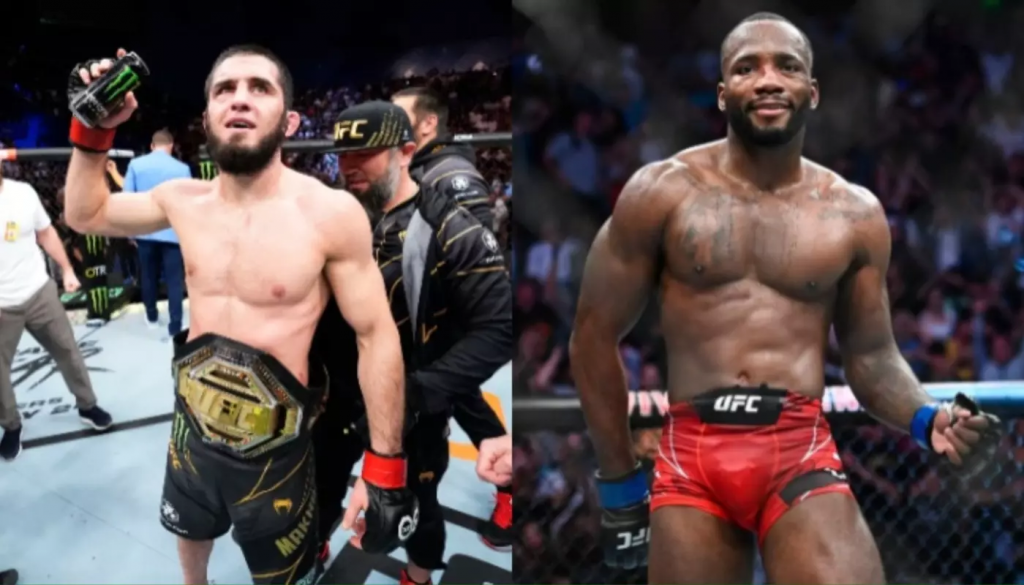
And speaking of moving up in weight, talks of a fight against Leon Edwards have been circulating; with Edwards being an elite welterweight in his prime, and a rough matchup for Islam, doing his same general thing on the feet but much better and significantly bigger, with the best defensive grappling out of any of Islam’s opponents to boot, a win over Edwards would catapult Islam into top ten GOAT conversations.
Whatever his next move, Makachev had better hurry; he’s 33, and is a good enough fighter to deserve more elite wins on his resume. Hopefully, the UFC actually functions like a proper company, and gives him the fights he deserves. I immensely dislike Makachev as a fighter in just about every sense, but I cannot deny how impressive both his skillset and improvement has been in his recent run.
This is DiamondElbows, signing off.
